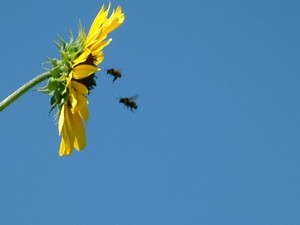04 Feb Wed 2009
From Columella to Tull
Lucius Junius Moderatus Columella was a Roman nobleman from a family of farmer-soldiers, born in AD 4, who lived until AD 70. He was the father of scientific agriculture and author of "Re Rustica," "On Agriculture." He learned much of what he knew from his uncle Marcus, who practiced a very traditional form of agriculture. Though Columella's practiced came to differ from those of his ancestors, he found more in their efforts to admire than to reject.
His book is filled with all kinds of practical information, from techniques of plowing to his favorite recipes for beans, to discussions on hygiene, to architecture, astronomy, religion, philosophy, science of all kinds, economics, marketing and more. His essays on beekeeping remained the definitive work of the subject far into the 18th century!
Uncle Marcus figures greatly in his work, as a man and a metaphore for the older ways of Roman farming. In example, Marcus believed that bathing, housing and clothing weakened a farmer as much as a soldier, and that the discipline required for the battlefield or the agricultural field required a deprevation of all luxury. Columella takes a more moderate approach, and tests the hypothesis to learn that while excessive luxury decreases the efficiency of his laborers, a deprevation also decreases the efficiency of his laborers. He ends his essay by describing what amount and kinds of luxury he found to yield the best results.
Another example lies in his tillage of beans. He found that there was no end to the improvement of beans by tillage. Yet, the cost of tillage prevented farmers from tilling all the time! So, he conducted experiments and found that if a farmer tilled beans 3 times during the year and one time during winter, the farmer would earn the greatest return to the cost of tillage.
In 1731, Jethro Tull updated Columella's work with the new scientific learning of the Enlightenment. His important work, the "Horse Hoeing Husbandry" was mangled by his first publisher, who even goofed the title (it was supposed to be the "Deep Hoeing Husbandry"). Tull quickly found a new publisher and republished a more correct volume.
His work was widely published and pirate copies flooded Europe, many of which were correct transcriptions...but quite a few of which presented false information. His work was translated into French by the great agriculturalist M. Monceau, who shared it with his friends, translating it into various Scandinavian, Germanic and Italic languages. Yet it was the supreme misfortune that Monceau chose as his principle copy one of the pirate versions that was incorrect, and a translator who admitted freely to not understanding English very well.
Tull remained virtually unheard of and unread in England, and it took a retranslation of the French into English many years later to reintroce him in his native land. Some VCR manuals translated from English to Japanese and back into English are more coherent than the Horse Hoeing Husbandry's reintroduced to England and nobody could understand what the fad was about on the Continent.
In 1997, we found one of only a few remaining copies of the original second (correct) edition and quickly copied it. We began to improve upon Jethro Tull's work by introducing into Columella's work the understandings of modern science. In doing so, we remember Columella's undying curiosity and beautiful poetry in this blog!

